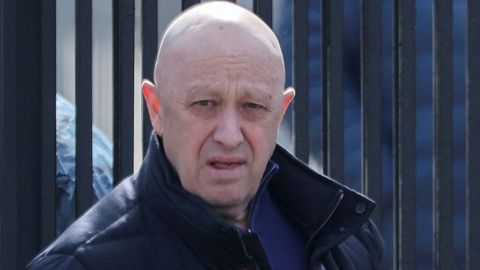
Yevgeny Prigozhin in an archive picture JULIJA MOROZOVA | Reuters
The agreement means the dissolution of the Wagner Group, at least in Russia and Ukraine
The deal between the Kremlin and the head of the Wagner Group, Yevgeny Prigozhin, which ended the 24-hour armed rebellion of the mercenaries, still has many unknowns, but is taken for granted, at least in Russia and Ukraine, this private military company with tentacles in Africa and the Middle East to the east.
These are the keys that are currently known:
Where is the head of the Wagner group?
He has not been heard from since he was photographed and filmed in his vehicle leaving the southern city of Rostov-on-Don after leading it with his men for 24 hours. The press service of Concord, owned by Prigozhin, told an international Russian-language television channel RTVI that his boss “is not in contact yet” and that he “will answer questions when he is in a (situation to establish) normal communication”.
An agreement reached between Moscow and him, brokered by Belarusian President Alexander Lukashenko, stipulates that Prigozhin will go into exile in Belarus without prosecution for organizing an armed rebellion, as revealed by the Kremlin. However, the case opened by the Russian State Prosecutor’s Office on Friday night under Article 279 of the Criminal Code – which carries a sentence of between 12 and 20 years in prison – is still open, according to the newspaper. Kommersant.
Where are the mercenaries?
For now, it is not known where the rebel mercenaries are. Prigozhin only announced on Saturday that they were withdrawing “to their bases” and deployment locations, many of which had been in Ukraine until now.
What does the agreement with the Kremlin foresee for them?
Security guarantees that they will not be prosecuted by the Russian judiciary either. Mercenaries who did not “directly” participate in the rebellion will be able to conclude contracts with the Russian Ministry of Defense, which will be subordinated to the command of Minister Sergei Shoigu and Chief of the General Staff Valery Gerasimov.
Weren’t the mercenaries looking for the head of the military?
Yes, Prigozhin said he would not surrender until he “had in his power” Shoigu and Gerasimov, whom he held responsible for the “chaos” in Ukraine and the death of some “100,000 Russian soldiers” at the front due to their lack of leadership.
The conflict between Chief Wagner and the military command escalated for months, but the last straw was an alleged missile attack by Russian forces on a mercenary rear camp in Ukraine. Now many military analysts and bloggers are wondering whether the deal reached between the Kremlin and Wagner will lead to the removal of Shoigu or Gerasimov in the coming days.
Let it be known, Šojgu remains in his position for now. His visit to the front announced by his ministry today aims to convey this message, although in reality it is unknown whether the trip was before or after the rebellion Wagnerites.
So what do mercenaries get with this deal?
For now, they saved his life and professional future, without having to spend up to 20 years behind bars.
What does the Kremlin gain from this?
In addition to ending the rebellion with incalculable consequences for the structure of the government and the security of citizens, Russian President Vladimir Putin and Shoigu managed to subdue Wagneritesthe most powerful and dangerous rogue armed group, and force them to submit to the Defense.
In June, they ordered all “volunteer” units in Russia to sign contracts with the ministry by July 1, which Prigozhin flatly refused to do. In addition, Putin “disarmed” the person who started the power struggle and who increasingly defied him, although she never recognized political ambitions.
What does the agreement mean for the future of the Group?
That Wagner’s group will be dismantled as such, at least in Russia and Ukraine, where it was present when the Donbass conflict broke out in 2014 and again in the current war started by Russia in February 2022.
Several of the mercenaries’ social networks on VKontakte, Russia’s Facebook, were blocked on Saturday, billboards across Russia for the recruitment of fighters were dismantled and their marketing products were removed from e-commerce. Private military companies are illegal in Russia, although others have sprung up in the country as a result of the war in Ukraine, but have operated in the shadows as the Kremlin’s armed spleen abroad.
What will happen to mercenaries in Africa and the Middle East?
This is one of the big unknowns, although in principle they could continue to operate on other continents if the Kremlin so wishes, since they operate where Putin cannot officially send forces, so in this sense the services of mercenaries are in his favor.
The Wagnerites they were in Syria and are present in several other countries, from the Central African Republic to Mali, Libya and Sudan, although Prigozhin recently denied that they were in the latter country. In those countries, mercenaries train forces, protect natural resources – which are also exploited by Wagner-linked companies, according to the West – and fight in support of armed rebels or jihadists.
Source: La Vozde Galicia
I am Amelia James, a passionate journalist with a deep-rooted interest in current affairs. I have more than five years of experience in the media industry, working both as an author and editor for 24 Instant News. My main focus lies in international news, particularly regional conflicts and political issues around the world.







